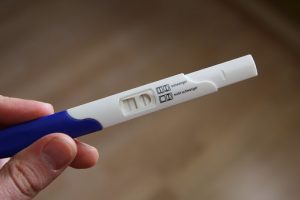It’s no secret that diet has an important role in conceiving and carrying a baby through the term. Even if you’re not infertile, you could use a boost in fertility through diet. So can a plant-based diet help fertility?

In the US, 12 to 13 couples out of 100 face difficulties getting pregnant. Infertility can impact either man or woman, and sometimes even both. While you should definitely seek help from a fertility clinic, you should also analyze your lifestyle and see what you can do to make things better.
What you eat and drink has a direct impact on your entire body, including your reproductive system. So eating a healthy, well-balanced diet like a plant-based diet has the potential to boost fertility. In fact, many plant-based foods are known to be good for infertility.
Infertility
If you’re having trouble getting pregnant for at least six months of trying, you may be diagnosed as infertile. For women under the age of 35, this time can be a year. Even if you do get pregnant but have trouble carrying the pregnancy to term, that may also qualify as infertility.

Some women may not be able to get pregnant even after successfully having a baby. This type of infertility is called secondary infertility.
Similarly, men can also be infertile. There can be many causes behind male infertility, and sometimes even a combination of several causes. However, it’s hard to find the cause behind a male’s infertility. As many as 50 percent of cases of male fertility are like that, according to the National Health Institute.
Causes Behind Infertility in Women
The cause behind infertility may impact the three main biological processes that result in a successful pregnancy. The first is ovulation when your ovaries release mature eggs. The second one is fertilization when the sperm meets the egg in the fallopian tube. Lastly, implantation when the fertilized egg attaches to the uterus lining to grow into a fetus.
Ovulation Disorders
According to Mayo Clinic, one in four couples face infertility because of ovulation disorders. Problems with ovaries or hormonal imbalances result in ovulation disorders. Here are the ovulation disorders that affect women:
- PCOS: Polycystic Ovary Syndrome or PCOS causes hormonal imbalance and is a very common cause for infertility in women. Besides trouble conceiving, weight gain, acne, and hair growth are signs of PCOS.
- Premature Ovarian Failure: Premature ovarian failure results in premature loss of mature eggs in the ovaries. It may be caused by an autoimmune response that destroys the eggs.
- Hypothalamic Dysfunction: The pituitary gland produces two hormones that aid ovulation. The production can be disrupted by stress or sudden weight loss or gain. Irregular or absent menstrual periods are a sign of hypothalamic dysfunction.
Endometriosis
Endometriosis is a condition where the tissue that usually grows inside the uterus starts growing outside it in the pelvic region. The complication of this disease is infertility, as it may scar and block fallopian tubes. Even if the sperm meets the egg, the fertilized egg may have trouble implanting to the uterus lining.
Pelvic Inflammatory Disease
Pelvic inflammatory disease (PID) is an infection that affects the fallopian tubes and the uterus and is caused by sexually transmitted infections.
Scarring from Previous Surgery
Previous abdominal or pelvic surgery may also result in infertility or complications in pregnancy.
Uterine Fibroids
Although fibroids don’t necessarily cause infertility, these growths inside the uterus can sometimes block the fallopian tube, making it difficult for an egg to get fertilized.
Medications
Certain drugs may also negatively impact fertility in women. If you’ve had chemotherapy because of cancer, infertility could be a side effect. Similarly, antidepressant drugs and anti-inflammatory drugs have also been associated with fertility problems.
Smoking and Alcohol
Smoking is a risk factor for infertility in women, as it can damage the fallopian tubes. Also, smoking during pregnancy can be quite risky and cause miscarriage. Similarly, too much alcohol is also a bad thing for women who want to have kids.
Age
Infertility is a natural occurrence in women as they age and reach menopause. In the mid-30s, the production of eggs and the quality of those eggs starts to decline. This is why it can be difficult for some women over 35 years to get pregnant even if they are healthy.
Causes Behind Infertility in Men
Just like in women, certain biological processes ensure fertility in men. There should be an effective production of sperm, and it should reach the semen and mix with it. Also, the sperm count should be enough for the odds of fertilizing an egg. Similarly, the sperm should be healthy and be able to move to the fallopian tube.

Here are the main causes of infertility in men:
Varicocele
Varicocele is the swelling of the veins around the testicles. It’s a common cause of infertility in men and is easily reversible. This issue reduces the quality and count of sperm. Doctors don’t exactly know the cause behind it, but there’s speculation that it’s because of temperature irregularities.
Hormonal Imbalance
Hormonal imbalance, particularly, lower production of testosterone can affect the production of sperm. It could be because of the testicles or any other system in the body linked with hormone production, such as the pituitary, adrenal, and thyroid glands.
Sexual Problems
Sexual problems like erectile dysfunction or premature ejaculation may also cause male infertility. However, these problems can be resolved either with medication or lifestyle changes, such as a plant-based diet.
Infections
Certain infections can lower sperm production or impact the overall quality of the sperm. STIs like HIV or gonorrhea may reduce fertility in men and also impose the danger of infecting their partner.
Retrograde Ejaculation
In retrograde ejaculation, the semen ends up in the urinary bladder instead of coming out of the penis. This issue usually results from medical conditions, injury, or surgery. Semen can be recovered though for secondary fertilization methods.
Smoking and Alcohol
Smoking affects the sperm count in men, just like it impacts female fertility. Similarly, overconsumption of alcohol can interfere with testosterone production. It’s also associated with sexual problems in men. Even fatty liver disease caused by alcohol may impact fertility in men.
Autoimmune Response
In some men, an autoimmune response may destroy sperm, thinking they are outside agents in the body.
Can a Plant-based Diet Help Fertility?
People have been treating infertility with diets for thousands of years. Certain foods seem to improve fertility in both women and men and deal with their unique fertility issues. Similarly, certain foods and lifestyle choices do the opposite.

Now, we have more hard scientific evidence that one’s diet plays an increasingly important role in boosting fertility. If you’re eating healthy, your risk of infertility can reduce significantly. A review study by the researchers at Harvard Medical School has found a strong link between diet and fertility in both men and women.
The study found that certain nutrients and vitamins were essential for women who want to get pregnant. While it includes vitamin B12 and omega-3 fatty acids, which come from animal sources, it also points out that red meat and trans fats are not good for couples trying to get pregnant.
The study also noted that isoflavones might help female fertility, while antioxidants may be comparatively more beneficial for men. Healthy diets like a plant-based diet can increase the sperm count in men, boost their fertility.
Weight Management in Women
Another study, published in the Journal of Obstetrics and Gynecology, found that a healthy diet, paired with physical activity and weight control, can reduce the risk of ovulatory disorders by 69 percent.
If you notice, this particular study mentions weight control. We already know that obesity is a risk factor for myriads of disease. However, it also affects fertility and pregnancy. Just by losing weight and maintaining a healthy weight, women can reduce the risk of common ovulatory disorders, such as PCOS.
A plant-based diet is known for good weight management. It promotes a healthy body mass index (BMI). That’s one way it tackles infertility causes. Moreover, it can easily provide you a well-balanced nutrient profile containing complex carbs, fiber, protein, omega-3 fatty acids, folic acid, vitamins, and healthy unsaturated fats.
Yes, some of the nutrients mentioned in the Harvard study come mostly from animals, but you can also get them from plant-based sources. Brussel sprouts, chia seeds, flaxseeds, and walnuts are excellent sources of omega-3 fatty acids.
Can Diet Affect Male Fertility?
Believe it or not, diet affects male fertility as well. A poor diet rich in trans fats, sugary foods, and animal proteins can lower sperm count and reduce the quality of semen. In this video, Dr. Michael Greger cites different studies that have time and again proved that male infertility could easily be treated with dietary and lifestyle changes.
The main culprit in this regard are dioxins, which are environmental pollutants that you may be getting from animal-based products. On the other hand, fruits and vegetables can positively impact male fertility by improving semen quality and increasing sperm count. Therefore, it increases the odds of fertilization of eggs in your partner.
What Plant-based Foods Boost Fertility?
Certain foods may especially be beneficial for couples trying to conceive. Whether you have fertility issues or not, these foods should be the highlight of the diet of parents to be:
1. Spinach
Spinach is great for female fertility because it’s rich in folate. In fact, most leafy green vegetables are good because they contain folate. However, spinach is king when it comes to this vitamin, as just a single cup can provide you 100 mcg of folate.

One study found that dietary folate increased the rate of implantation and also helped ensure live birth. Similarly, the iron in spinach also improves fertility.
2. Tomatoes
Tomatoes, especially cooked tomatoes, may improve fertility, especially in men. These are rich in lycopene, which seems to improve male fertility even more so than women. There are so many ways to incorporate tomatoes into your diet, especially cooked ones.
3. Lentils
Lentils are great, in general, but for women hoping to conceive, they provide two important nutrients: fiber and iron. Fiber removes excess estrogen from the body, whereas iron helps lower the risk of many infertility causes in women. Plus, it’s a healthy source of protein too.
Harvard researcher’s so-called Fertility Diet also used lentils as a source of protein and fiber. The study saw positive impacts because of the no-strings-attached nature of the plant-based protein.
4. Seaweed
Seaweed is good for women already following a plant-based diet as it can ensure they get sufficient amounts of iodine. This sea vegetable is also beneficial in treating endometriosis, which is a painful condition that may result in infertility.
Another way it helps fight infertility is through maintaining the right hormonal balance. It prevents excess production of estrogen.
5. Quinoa
Quinoa, as well as other whole grains, provide generous amounts of fiber that regulates blood sugar levels. Maintaining blood sugar levels can ensure that your hormones don’t get imbalanced. Plus, it can also reduce the risk of diabetes before and during pregnancy.

6. Avocado
Healthy fats are good for fertility, and avocados can provide plenty of those. They meet all the requirements for fertility-boosting food. For instance, these are also rich in folate and antioxidants.
The monounsaturated fats of avocado, in particular, can reduce the risk of ovulatory disorder. You can also use it if you have an ovulatory disorder like PCOS.
7. Walnuts
You’ll need to increase more walnuts in your daily nut snack, as they will provide you with omega-3 fatty acids. These are the only nuts that have this important and healthy component. As research shows, omega-3 fatty acids can boost fertility.
Wrap Up
Fertility issues are becoming ever more prevalent around the world, in both men and women. Whether it’s our diet or environment, but there’s something that we’re doing wrong. So it’s high time we changed our diet and adopted a healthier lifestyle.
So can a plant-based diet help fertility? Absolutely, as it checks all the requirements of a healthy fertility diet. There are success stories that show how a plant-based diet helped couples get pregnant and avoid expensive medical procedures.










